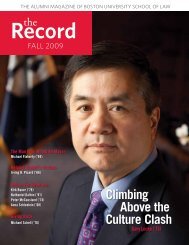the nature of representation: the cherokee right ... - Boston University
the nature of representation: the cherokee right ... - Boston University
the nature of representation: the cherokee right ... - Boston University
Create successful ePaper yourself
Turn your PDF publications into a flip-book with our unique Google optimized e-Paper software.
100 PUBLIC INTEREST LAW JOURNAL [Vol. 15<br />
2. Pressures on Cherokee Land<br />
In 1802, <strong>the</strong> United States and Georgia reached an agreement: Georgia would<br />
“cede its western land claims to <strong>the</strong> United States,” so long as <strong>the</strong> United States<br />
extinguished “Indian title to lands within <strong>the</strong> state.” 43 By its terms <strong>the</strong> compact<br />
required <strong>the</strong> U.S. to make its best efforts to get <strong>the</strong> Cherokees to leave Georgia.<br />
“Strictly speaking, treaties should have held greater legal weight than did <strong>the</strong> 1802<br />
agreement with Georgia, yet by <strong>the</strong> late 1810s some involved in Indian affairs were<br />
dismissing adherence to <strong>the</strong> treaties as needless, even foolish.” 44 Though <strong>the</strong><br />
Cherokees “held indisputable constitutional guarantees” against encroachment on<br />
Cherokee land, 45<br />
<strong>the</strong> 1802 compact provided some authority on which those<br />
seeking removal could rely. Yet <strong>the</strong> 1802 compact did not justify forced removal.<br />
The Cherokee Phoenix suggested that to satisfy <strong>the</strong> compact, <strong>the</strong> U.S. government<br />
should pay <strong>of</strong>f Georgia ra<strong>the</strong>r than try to purchase Cherokee land. 46<br />
In 1824,<br />
President Monroe highlighted <strong>the</strong> limited obligation imposed by <strong>the</strong> compact:<br />
I have full confidence that my predecessors exerted <strong>the</strong>ir best endeavors to<br />
execute this compact (between <strong>the</strong> United States and <strong>the</strong> State <strong>of</strong> Georgia) in<br />
all its parts, <strong>of</strong> which, indeed, <strong>the</strong> sums paid, in fulfillment <strong>of</strong> its stipulations,<br />
are a full pro<strong>of</strong> . . . I have no hesitation, however, to declare it as my opinion,<br />
that <strong>the</strong> Indian title was not effected in <strong>the</strong> slightest circumstance by <strong>the</strong><br />
compact with Georgia, and <strong>the</strong>re is no obligation on <strong>the</strong> United States to<br />
remove <strong>the</strong> Indians by force. 47<br />
Ultimately, societal pressure for Cherokee land subsumed <strong>the</strong> legal issue <strong>of</strong> <strong>the</strong><br />
power and role <strong>of</strong> <strong>the</strong> compact. The discovery <strong>of</strong> gold in July <strong>of</strong> 1829 on Cherokee<br />
lands in nor<strong>the</strong>astern Georgia, when coupled with <strong>the</strong> already existing desire by<br />
whites for Cherokee farming and agricultural land, made removal much more urgent<br />
for both Georgia and <strong>the</strong> Jackson administration. 48<br />
3. Cherokee Leadership Divides<br />
By 1834, Principal Chief John Ross, counter-intuitively, could have been both<br />
<strong>right</strong> and wrong when he wrote in a letter that “[t]he Cherokees, as a people are<br />
united.” 49 Though <strong>the</strong> people were behind him, <strong>the</strong> Cherokees were no longer<br />
43<br />
Strickland, supra note 19, at 96.<br />
44<br />
DENSON, supra note 8, at 21.<br />
45<br />
William MacDonald, Jacksonian Democracy 1829-1837, in 15 THE AMERICAN<br />
NATION: AHISTORY 170 (1906).<br />
46<br />
The Cherokee Phoenix, July 27, 1833, at 3 (“No purchase can be made <strong>of</strong> <strong>the</strong><br />
Cherokees, it will be cheaper to <strong>the</strong> Government to award Georgia a sum.”).<br />
47<br />
John Ross, Annual Message (Oct. 10, 1832), in 1THE PAPERS OF CHIEF JOHN ROSS,<br />
supra note 14, at 252 (citing James Monroe, 1817-1833, in ACOMPILATION OF THE<br />
MESSAGES AND PAPERS OF THE PRESIDENTS, 1789-1902, at 234-37 (James D. Richardson,<br />
comp., 1905)).<br />
48<br />
MOULTON, supra note 23, at 40.<br />
49 Letter from John Ross to William H. Underwood (Aug. 12, 1834), in 1THE PAPERS









